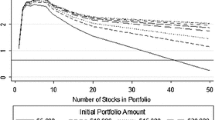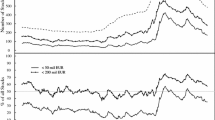Abstract
The success of trading strategies that lead to abnormal excess returns based on annual/monthly investment periods has recently declined significantly. We adopt the original frameworks of De Bondt and Thaler (J Finance 40(3):793–808, 1985) and Jegadeesh and Titman (J Finance 48(1):65–91, 1993) to an intraday reversal as well as momentum strategy scheme based on 5-min stock returns. We analyze 16 reversal and momentum strategies each with ranking and holding periods of 60, 120, 180 or 300 min (reversal strategies) and 15, 30, 45 or 60 min (momentum strategies) from a retail investor’s perspective. We find no indications for momentum in stock prices but strong indications for reversals. Our results are furtherly robust regarding to market adjustment, portfolio sizes and skipping periods between ranking and holding periods. Our results show that the returns of the reversal strategies are statistically significant, however, yet too small to be economically significant. Our results also confirm the efficiency on the stock markets.
Similar content being viewed by others
Notes
We also control for day effects in our reversal framework due to the existence of calendar effects and their influence on the success of reversal returns in the original framework (e.g., Chopra et al. 1992). We subdivided the week in the five common trading days. We do not find significant indications for a consistent pattern of day effects in our results. Therefore, we do not report these results in detail.
We also control for daytime effects in our momentum framework due to the existence of calendar effects and their influence on the success of momentum returns in the original framework (e.g., Glaser and Weber 2003). We subdivided the trading day in three two hour periods (9 am–10.59 am, 11 am–12.59 pm and 1 pm-2.59 pm) and one two and a half hour period (3 pm–5.30 pm). We do not find significant indications for a consistent pattern of daytime effects in our results. Therefore, we do not report these results in detail.
For standard orders of “High Volume” traders, see Deutsche Boerse (2019) as well as https://www.xetra.com/xetra-en/trading/trading-fees-and-charges.
References
Bagehot, W.: The only game in town. Financ. Anal. J. 27(2), 12–14, 22 (1971)
Ball, R., Kothari, S., Shanken, J.: Problems in measuring portfolio performance—an application to contrarian investment strategies. J. Financ. Econ. 38(1), 79–107 (1995)
Barber, B.M., Odean, T.: All that glitters: the effect of attention on the buying behavior of individual and institutional investors. Rev. Financ. Stud. 21, 785–818 (2008)
Barber, B.M., Odean, T.: The behavior of individual investors. In: Constantinides, G.M., Harris, M., Stulz, R.M. (eds.) Handbook of the Economics of Finance, pp. 1533–1570. Elsevier, Amsterdam (2013)
Barroso, P., Santa-Clara, P.: Momentum has its moments. J. Financ. Econ. 116(1), 111–120 (2015)
Black, F.: Towards a fully automated exchange. Financ. Anal. J. 27(4), 28–35, 44 (1971)
Boehmer, E., Fong, K., Wu, J.: Algorithmic Trading and Market Quality: International Evidence. AFA 2013 San Diego Meetings Paper. Available at SSRN: https://ssrn.com/abstract=2022034 (2018)
Chan, L., Jegadeesh, N., Lakonishok, J.: Momentum strategies. J. Finance 51(5), 1681–1713 (1996)
Chopra, N., Lakonishok, J., Ritter, J.: Measuring abnormal performance: do stocks overreact? J. Financ. Econ. 31(2), 235–268 (1992)
Chordia, T., Subrahmanyam, A., Tong, Q.: Have capital market anomalies attenuated in the recent era of high liquidity and trading activity? J. Account. Econ. 58(1), 41–58 (2014)
Chuang, H., Ho, H.-C.: Implied price risk and momentum strategy. Rev. Finance 18(2), 591–622 (2014)
Conrad, J., Kaul, G.: Long-term overreaction or biases in computed returns. J. Finance 48(1), 39–63 (1993)
Cross, F.: The behavior of stock prices on fridays and mondays. Financ. Anal. J. 29(6), 67–69 (1973)
Da, Z., Gurun, U., Warachka, M.: Frog in the pan: continuous information and momentum. Rev. Financ. Stud. 27(7), 2171–2218 (2014)
Dhar, R., Kumar, A.: A non-random walk down the main street: impact of price trends on trading decisions of individual investors. Working Paper, Yale School of Management—International Center for Finance (2001)
Daniel, K., Moskowitz, T.: Momentum crashes (NBER Working Paper No. 20439) (2014)
Daniel, K., Hirshleifer, D., Subrahmanyam, A.: Investor psychology and security market under- and overreaction. J. Finance 53(6), 1839–1885 (1998)
De Bondt, W., Thaler, R.: Does the stock market overreact? J. Finance 40(3), 793–808 (1985)
Deutsche Boerse: Price List for the Utilization of the Exchange EDP of FWB Frankfurt Stock Exchange and of the EDP XONTRO. Frankfurt (2019)
Foltice, B., Langer, T.: Profitable momentum trading strategies for individual investors. Fin. Mark. Portf. Manag. 29(2), 85–113 (2015)
French, K.: Stock returns and the weekend effect. J. Financ. Econ. 8(1), 55–69 (1980)
Fuertes, A.-M., Miffre, J., Tan, W.-H.: Momentum profits, nonnormality risks and the business cycle. Appl. Financ. Econ. 19(12), 935–953 (2009)
Glaser, M., Weber, M.: Momentum and turnover: evidence from the German stock market. Schmalenbach Bus. Rev. 55(2), 108–135 (2003)
Gomber, P., Arndt, B., Lutat, M., Uhle, T.: High-Frequency Trading (Working Paper). Goethe Universität Frankfurt am Main, Frakfurt a.M. (2011)
Hau, H.: Geographic patterns of trading profitability in Xetra. Eur. Econ. Rev. 45(4–6), 757–769 (2001)
Hendershott, T., Riordan, R.: Algorithmic trading and the market for liquidity. J. Financ. Quant. Anal. 48(4), 1001–1024 (2013)
Hong, H., Stein, J.: A unified theory of underreaction, momentum trading, and overreaction in asset markets. J. Finance 54(6), 2143–2184 (1999)
Hong, H., Lim, T., Stein, J.: Bad news travels slowly: size, analyst coverage, and the profitability of momentum strategies. J. Finance 55(1), 265–295 (2000)
Hwang, S., Rubesam, A.: The disappearance of momentum. Eur. J. Finance 21(7), 584–607 (2015)
Jacobs, H., Regele, T., Weber, M.: Expected Skewness and Momentum (Working Paper SSRN). https://doi.org/10.2139/ssrn.2600014 (2016)
Jegadeesh, N.: Evidence of predictable behaviour of security returns. J. Finance 45(3), 881–898 (1990)
Jegadeesh, N., Titman, S.: Return to buying winners and selling losers: implication for stock market efficiency. J. Finance 48(1), 65–91 (1993)
Jegadeesh, N., Titman, S.: Profitability of momentum strategies: an evaluation of alternative explanations. J. Finance 56(2), 699–720 (2001)
Kahnemann, D., Tversky, A.: Availability: a heuristic for judging frequency and probability. Cogn. Psychol. 5(2), 207–232 (1973)
Kyle, A.: Continuous auctions and insider trading. Econometrica 53(6), 1315–1335 (1985)
Lehmann, B.: Fads, martingales and market efficiency. Q. J. Econ. 105(1), 1–28 (1990)
Lesmond, D., Schill, M., Zhou, C.: The illusory nature of momentum profits. J. Financ. Econ. 71(2), 349–380 (2004)
Lo, A.: The adaptive markets hypothesis. J. Portf. Manag. 30(5), 15–29 (2004)
Lopez de Prado, M.: Advances in High Frequency Strategies (Working Paper SSRN). https://doi.org/10.2139/ssrn.2106117 (2012)
Odean, T.: Do investors trade too much? Am. Econ. Rev. 89(5), 1279–1298 (1999)
Prix, J., Loistl, O., Huetl, M.: Algorithmic trading patterns in Xetra orders. Eur. J. Finance 13(8), 717–739 (2007)
Rouwenhorst, G.: International momentum strategies. J. Finance 53(1), 267–284 (1998)
Sarr, A., Lybeck, T.: Measuring Liquidity in Financial Markets (IMF Working Paper WP/01/232) (2002)
Scholtus, M., van Dijk, D., Frijns, B.: Speed, algorithmic trading, and market quality around macroeconomic news announcements. J. Bank. Finance 38, 89–105 (2014)
Schulmeister, S.: Profitability of technical stock trading: has it moved from daily to intraday data? Rev. Financ. Econ. 18(4), 190–201 (2009)
Scott, R.C., Horvath, P.A.: On the direction of preference for moments of higher order than the variance. J. Finance 35(4), 915–919 (1980)
Veronesi, P.: Stock market overreaction to bad news in good times: a rational expectations equilibrium model. Rev. Financ. Stud. 12(5), 975–1007 (1999)
Viebig, J.: High frequency trading, statistical arbitrage und die adaptive markets hypothesis. Corp. Finance biz 2013(8), 469–478 (2013)
Acknowledgements
We would like to thank Professor Stefan Wendt, Reykjavik University, Professor Marco Wilkens, Augsburg University and Professor Michael Breitner, Leibniz Universität Hannover, for helpful comments and suggestions. We further thank participants of the 2015 Annual Meeting of Financial Management Association, participants of the 2015 Annual Meeting of the Academy of the Financial Services, participants of the 2016 Annual Meeting of the Eastern Finance Association, participants of the 2016 Behavioural Finance Working Group Conference, participants of the 2016 Annual Meeting of German Operations Research Society, participants of the 2018 Annual Meeting of Eastern Finance Association and seminar participants at Bamberg University. Further, we would like to thank anonymous reviewers as well as Professor Markus Schmid as Editor of Financial Markets and Portfolio Management for their valuable comments and support.
Funding
We do not receive any grants or funds for our paper. All remaining errors are our own.
Author information
Authors and Affiliations
Corresponding author
Additional information
Publisher's Note
Springer Nature remains neutral with regard to jurisdictional claims in published maps and institutional affiliations.
Rights and permissions
About this article
Cite this article
Herberger, T.A., Horn, M. & Oehler, A. Are intraday reversal and momentum trading strategies feasible? An analysis for German blue chip stocks. Financ Mark Portf Manag 34, 179–197 (2020). https://doi.org/10.1007/s11408-020-00356-2
Published:
Issue Date:
DOI: https://doi.org/10.1007/s11408-020-00356-2




